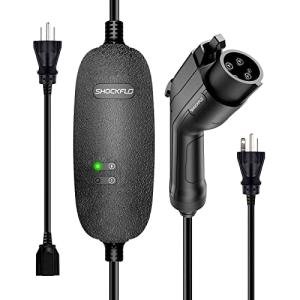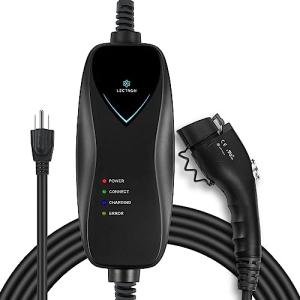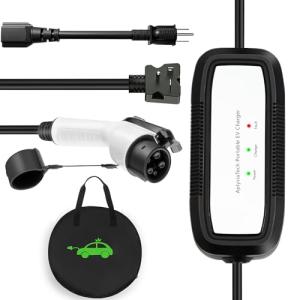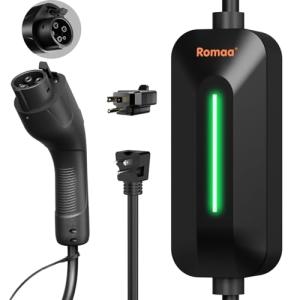Level 1 chargers are the simplest way to power up your electric vehicle. They use a standard 120-volt outlet, the same kind you plug almost everything into at home. That means you won’t need any special installation. Just grab the charger that comes with your car, plug it in, and you’re good to go.
One of the best things about Level 1 chargers is their convenience. If you already have a regular outlet available, you're all set. It’s not the fastest option out there, but it gets the job done while you sleep or during the day when you’re just hanging out at home. Depending on your vehicle, you can expect to get around 3 to 5 miles of range for every hour of charging.
However, keep in mind that if you drive a lot or have a big commute, a Level 1 charger might not be enough. You may find yourself waiting a long time to recharge your battery after a long day. For casual users or those who don’t drive too many miles daily, this is often a perfect choice.
If you’re looking into Electric Vehicle Charger Types for home use, Level 1 is an easy entry point. Just plug it in, and you don’t have to think twice about it. But if you want faster charging and have higher mileage needs, you might want to explore Level 2 chargers down the line. But for beginners, Level 1 is simple and effective!
Exploring Level 2 Charging Solutions
Level 2 charging solutions are a game changer for electric vehicle owners. If you’re looking for faster charging at home or in public spaces, this is the way to go. These chargers typically operate at 240 volts and can give you a solid boost in just a couple of hours. That's a huge time saver compared to standard Level 1 chargers that run on 120 volts.
One of the best things about Level 2 electric vehicle charger types is their versatility. Whether you have a home setup or want to charge at work, you’ll find plenty of options. Many people install wall-mounted chargers in their garages, making it super convenient to plug in when they get home. No need to worry if you forget; just park and charge!
When shopping for Level 2 chargers, look for features that match your lifestyle. Do you want Wi-Fi capability for tracking your charging status? Or maybe a unit that supports multiple vehicle types? There are plenty of smart chargers out there that come with user-friendly apps. These can help you monitor energy usage and even set charging schedules to take advantage of lower electricity prices.
Public charging stations are also increasingly popular as cities invest in infrastructure. You can find Level 2 chargers at coffee shops, shopping centers, and parking garages. Just plug in, grab a coffee, and by the time you're back, your car will be good to go. With the rising number of Level 2 charging solutions available, it’s easier than ever to keep your ride charged and ready.
ShockFlo 16 Amp Portable EV Charger with 6M Cable
Charge your electric vehicle at home or on the go with this versatile and convenient portable charger
Product information
$159.99
Product Review Score
4.16 out of 5 stars
148 reviewsProduct links
What Is Fast Charging
Fast charging is a game-changer for electric vehicle (EV) owners. If you’re tired of waiting around while your car fills up on juice, this charging method is your new best friend. Fast chargers pump out higher voltage and currents, which means you can get a decent charge in a fraction of the time compared to regular chargers.
How fast is fast charging? Well, it can give you anywhere from 50 to 350 kilowatts of power, depending on the charger and your vehicle’s capabilities. This means you could be back on the road in just 30 minutes or even less, depending on how empty your battery was to start. Talk about convenience!
So, what are the different Electric Vehicle Charger Types when it comes to fast charging? Most commonly, you’ll find Level 2 chargers in public places, which are usually good for home use, too. However, the real heroes are the DC fast chargers. These are the big boys you’ll see along highways, really designed to give your EV a supercharge during long trips.
If you're planning a road trip, knowing where to find these fast chargers is a must. Many apps and navigation systems will show you nearby charging stations, helping you keep your journey smooth and stress-free. Being able to quickly recharge can turn what used to be a long wait into a quick pit stop.
Tera 2025 Portable 40A Level 2 EV Charger
Charge your electric vehicle quickly and easily anywhere you go with this powerful portable charger
Product information
Product Review Score
4.69 out of 5 stars
47 reviewsProduct links
Benefits of Portable EV Chargers
When it comes to charging your electric vehicle, portable EV chargers are a game-changer. Imagine having the flexibility to charge your car wherever you are, whether you're at home, on the road, or visiting a friend. That kind of convenience makes portable chargers one of the coolest electric vehicle charger types out there.
One major benefit is the ease of use. Just plug your portable charger into a standard outlet, and you’re good to go. This means you don’t have to stress about finding a charging station. When you’re hunting for a spot or running on low battery, having a portable option can save the day. Plus, they often come with various adapters, making them compatible with different vehicle brands and models.
Another perk is the cost-effectiveness. Portable chargers are usually priced lower than installing a dedicated home charging station. If you're not putting in heavy mileage every day, a portable charger might be all you need to keep your battery topped up without breaking the bank. It’s a smart choice for those who want to dip their toes into the electric vehicle world without going all in.
Don’t overlook the lightweight and compact design of these chargers. They easily fit in your trunk or back seat, so you can always have one on hand. This is especially handy for road trips, camping adventures, or just everyday errands. Knowing you have that backup option gives you peace of mind as you cruise along.






